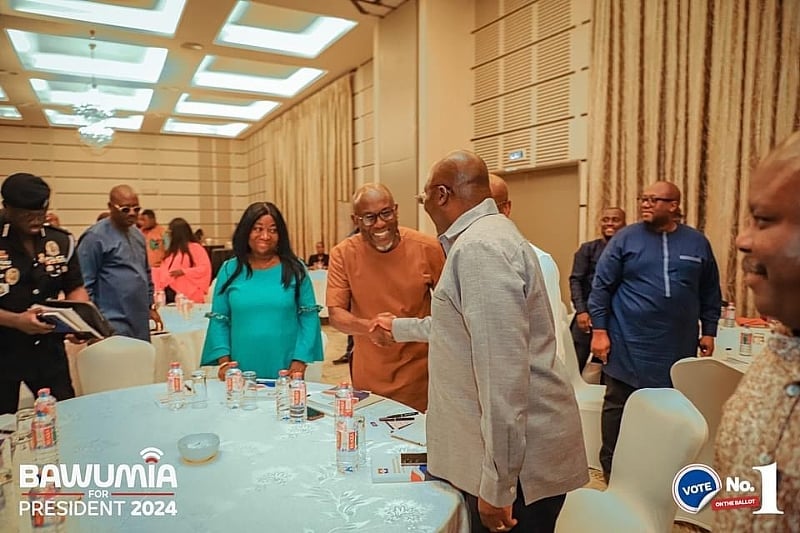Kofi Bentil, the Senior Vice President of IMANI Africa, a prominent think tank in Ghana, recently addressed the wave of political criticism directed at him following his public endorsement of Dr. Mahamudu Bawumia, the New Patriotic Party’s (NPP) flagbearer, in the 2024 Ghanaian presidential election. Bentil’s unwavering support for Bawumia, despite the latter’s loss in the election, sparked a backlash from various quarters, prompting Bentil to issue a statement reaffirming his commitment to independent thought and outspoken advocacy. His declaration underscores the tension between political allegiances and intellectual freedom, particularly in the charged atmosphere of a post-election period. It also highlights the complexities of public discourse in an era of social media, where expressions of support or dissent can easily be amplified and misinterpreted, leading to polarized opinions and personal attacks.
Bentil’s statement, published on Facebook, serves as both a defense of his actions and a broader commentary on the nature of political engagement and respectful dialogue. He emphasizes that his support for Bawumia stemmed from a genuine belief in the candidate’s vision and capabilities, rather than blind partisan loyalty. He asserts his right to express his views freely, regardless of prevailing public sentiment or potential repercussions. This stance reflects a commitment to intellectual integrity and a rejection of the pressure to conform to popular opinion, a principle crucial for fostering open and honest debate in a democratic society. Bentil’s insistence on maintaining his independence underscores the importance of critical thinking and nuanced perspectives in political discourse, particularly in the face of partisan pressures.
Furthermore, Bentil’s statement highlights the crucial distinction between respecting an individual and agreeing with their viewpoints. He argues that true respect lies in acknowledging another person’s right to hold differing opinions, even if those opinions are diametrically opposed to one’s own. He criticizes the tendency to conflate agreement with respect, suggesting that such an approach undermines genuine engagement and fosters an environment of intolerance. This observation is particularly relevant in the context of contemporary political discourse, which is often characterized by echo chambers and filter bubbles, where individuals are primarily exposed to information and perspectives that reinforce their existing beliefs. This phenomenon can exacerbate polarization and hinder meaningful dialogue across ideological divides.
Bentil’s assertion that he will “never be neutral on any issue I deem important” emphasizes his commitment to actively engaging in public discourse and advocating for his beliefs. This proactive approach to civic participation underscores his conviction that silence or neutrality on crucial issues can be a form of complicity. By refusing to remain silent, Bentil aims to contribute to informed public debate and hold those in power accountable. His commitment to taking a stand reflects a belief in the power of individual voices to shape public opinion and influence policy decisions. This approach encourages others to actively participate in shaping their communities and holding leaders accountable.
The phrase “leave the universe to turn” suggests Bentil’s acceptance of the potential consequences of expressing his views, even if they lead to criticism or disagreement. It reflects a certain degree of stoicism and a willingness to withstand public scrutiny for the sake of his convictions. This resilience in the face of opposition is a crucial characteristic for anyone engaging in public discourse, especially on contentious issues. Bentil’s willingness to accept the consequences of his opinions underscores his commitment to intellectual honesty and his belief in the importance of open debate, even if it results in personal criticism.
In conclusion, Kofi Bentil’s statement serves as a powerful reminder of the importance of independent thought, respectful dialogue, and active civic engagement. His unwavering commitment to expressing his views, regardless of potential backlash, underscores the vital role of critical voices in a democratic society. His emphasis on respecting differing opinions, even while strongly advocating for one’s own beliefs, offers a valuable lesson in fostering constructive dialogue and bridging divides in an increasingly polarized world. Bentil’s statement is not merely a personal defense but a call for greater intellectual integrity and respectful engagement in public discourse, crucial elements for a healthy and vibrant democracy. His declaration to remain actively involved in public discourse, even in the face of criticism, sets an example for others to engage constructively with the challenges facing their communities and the nation as a whole. Bentil’s statement ultimately emphasizes the importance of informed, principled engagement in public discourse as a cornerstone of democratic progress.














